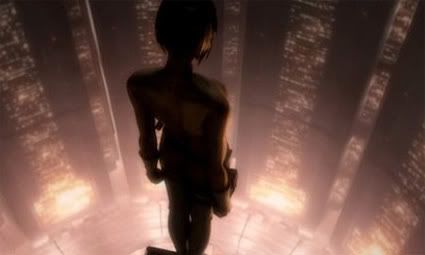Shooters can be curious beasts. Any game that pours you directly into the perspective of someone holding a gun empowers you to make choices, even if it’s just the choice of which weapon to pick up to fill one of your two precious slots in Halo. The more choices the player is called upon to make, the more a game from the first person perspective resembles a game centered around character and story instead of bullets and bloodshed. Balancing shooting action with role-playing can be difficult, and the urtext for it comes to us from an older game entitled Deus Ex.
Yeah, I sang the theme song with Yahtzee’s lyrics, who hasn’t?
Welcome to the future, where New York’s been attacked by terrorists and cybernetic enhancement is quickly becoming normal, even fashionable. Our hero is JC Denton, a man employed by the United Nations Anti-Terrorist Coalition and blessed with a variety of nanotech augmentations that aren’t just for show but let him punch bad guys in incredibly efficient ways. While taking the battle to streets it quickly becomes obvious that JC’s being manipulated, and we slowly realize that there’s a vast global conspiracy going on and it’s up to us to put a stop to it. Or, perhaps, decide how to take it in a better direction than these bozos are.
Deus Ex joined the pantheon of PC gaming back in 2000, and was quickly elevated to one of the highest seats there thanks to a game engine that actually supports balanced character building instead of just gluing new bits onto your guns. Modern games may spoon out achievements when you reach milestones but Deus Ex provides in-game rewards known as ‘skill points’ which are used to raise skills such as rifles, electronics and swimming. Which is a good thing, because without these point JC wouldn’t be able to hit the broad side of an oil tanker with an assault rifle, acts perplexed when looking at an electronic keypad and only holds his breath underwater for about 90 seconds. The last one isn’t quite so bad and considering how much swimming you’re likely to do, you’re much better off teaching yourself to pick locks more efficiently and keeping your rifle scope steady.
It was a dark and stormy night in New York…
The way the game supports your character-building is by presenting you with options for dealing with obstacles, from locked doors to boss fights. There’s almost always a way past a sealed entryway, be it a vent or a different door with a different locking mechanism, and most of the time if you’re not up for fighting a boss character you can just run your ass away. It’s also the sort of game where there really aren’t any invisible walls, and your health only regenerates if you choose to make it at the expense of your bio-electric energy reserves. It’s entirely possible to lose one or all of your limbs and to need to wiggle your way to a nearby health kit without being spotted by the cops.
Player choice also becomes a factor in conversations you choose to have. JC can be generous and make attempts to be personable, or he can be the sort of withdrawn, terse individual that just guns down the bad guys like many modern shooters show their heroes to be. I say “make attempts” because the voice acting and dialog in Deus Ex isn’t out to win any awards. JC sounds like he’s been gargling gravel for the last year or two and most of the other characters have hysterically stereotypical accents. The way the characters speak to one another is the first in a pair of pretty major flaws.
He’s a ladies’ man.
The other is the graphics. It’s an older game, so of course it’s not going to have the glitz and polish of something created last year, but Deus Ex looks bad even for a game from 2000. The designs of the levels and characters alike are blocky and rigid. There are a limited number of character skins and mouth animations are incredibly stilted. While I’d like to think there’s more to games (and people) than their looks, processing the visuals in the game can sometimes be a real chore.
However, under the horrendous appearance and occasionally terrible dialog is a plot that not only tries to influence the player but allows them to make an empowered decision. While quoting philosophy and whatnot is part of the dialog, when it works it shows a world where invisible powers are struggling to control mankind, and all of them want JC to operate as their scion in the conflict. But JC, and the player, are their own creature and will only obey the tenets of their own will. When we arrive in the endgame, JC does make the occasional quip intended to be clever, but also debates the pros and cons of his decisions with intelligence. How the game ends is entirely up to us.
Thus, from start to finish, Deus Ex puts the onus upon the player instead of taking them by the hand and pulling them through the plot. Instead of relying upon the fiction trope for which the game is partially named, we are given a set of options that allow us to become, for the would-be rulers of the world, a deus ex machina ourselves, appearing from the machine to give one of the powers exactly what they want. And that notion is more empowering than just about any firearm you’d care to name.
Stuff I Liked: Decent soundtrack, actual RPG structure, multiple approaches to obstacles and a near-future setting only slightly far-fetched.
Stuff I Didn’t Like: Even with modern texture updates the game’s a bit of an eyesore in places. A good portion of the dialog’s hard to swallow and I saw a couple plot twists coming a mile away.
Stuff I Loved: A decent amount of non-linearity calling upon the player to decide how to proceed, from the very first level on Liberty Island to the final decision to determine the ending of the game and, by extension, the fate of the world.
Bottom Line: For those nostalgic for the likes of System Shock 2 and for shooter fans looking for a game with a bit more depth than Halo or Modern Warfare, Deus Ex delivers. If you go in prepared for some of the dated material in the game, you won’t be disappointed.









